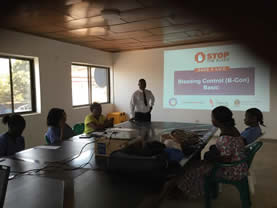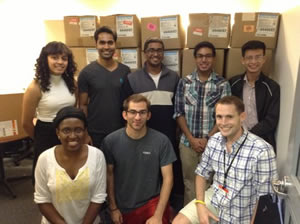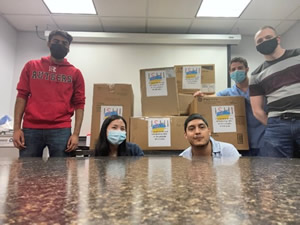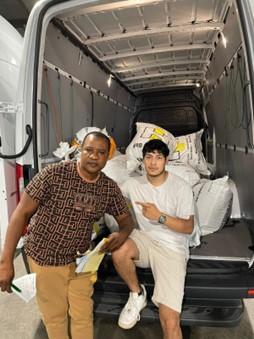CLUBS & ELECTIVES
- Fourth Year Clinical Elective: The Global Surgery Elective will be offered in collaboration with ISHI (International Surgical Heath Initiative) in several Low and Middle Income countries (LMIC) where surgical missions are organized. Each country offers a unique surgical and cultural experience for the student to experience in-person.
In order to receive credit, satisfactory completion of the following three components is required:
1. Development of a scholarly project
2. Participation in a surgical mission
3. Provide feedback
Surg 9100 Global Surgery
ACTIVE PROJECTS
Stop the Bleed Training in Sierra Leone (2017 - Present)
 The #StopTheBleed campaign’s Basic Bleeding Control Course (B-Con) sponsored by the American College of Surgeons is being disseminated to provider and layperson alike throughout the US. This is based on the fact that life-threatening bleeding leads to preventable deaths, and bystanders can become lifesavers. However, injury is not just an American problem and remains a leading cause of mortality across the globe, hitting the poorest countries especially hard.
The #StopTheBleed campaign’s Basic Bleeding Control Course (B-Con) sponsored by the American College of Surgeons is being disseminated to provider and layperson alike throughout the US. This is based on the fact that life-threatening bleeding leads to preventable deaths, and bystanders can become lifesavers. However, injury is not just an American problem and remains a leading cause of mortality across the globe, hitting the poorest countries especially hard.
Beginning in December 2017 and ongoing, NJMS faculty have been involved in the training of Sierra Leonean nationals including healthcare professionals, police officers, military personnel, and motorcycle taxi drivers. One instructor was trained and has since taught the B-Con course to several hundred other participants. It was so popular that there are plans to make the course mandatory for all staff at Connaught Hospital, the largest hospital in the country, and to expand beyond to the community.
NJMS will continue to support this endeavor to share knowledge and skills with the people of Sierra Leone via instruction, donation, and research. Given the high number of road traffic incidents in the country, we expect that these techniques will be put to use to save lives early and often.
RECOVER Initiative (2016 - Present)
 In the United States disposable, sterile, single-use supplies are the norm in the operating room (OR), emergency department (ED), and intensive care unit (ICU). Before an operation starts, the back table is prepared with all of the drapes, gowns, sponges, etc needed for the case. In the ED or ICU an excess of supplies may be brought to bedside for a procedure or wound care. But what happens when the case is cancelled, plans change, or a different set of supplies is needed? Supplies opened in the OR, and thus no longer sterile, but clean and unused become trash. Likewise with materials, opened or not, that are brought to a patient’s bedside but never used.
In the United States disposable, sterile, single-use supplies are the norm in the operating room (OR), emergency department (ED), and intensive care unit (ICU). Before an operation starts, the back table is prepared with all of the drapes, gowns, sponges, etc needed for the case. In the ED or ICU an excess of supplies may be brought to bedside for a procedure or wound care. But what happens when the case is cancelled, plans change, or a different set of supplies is needed? Supplies opened in the OR, and thus no longer sterile, but clean and unused become trash. Likewise with materials, opened or not, that are brought to a patient’s bedside but never used.
It has been estimated that two million pounds of recoverable materials worth over $15 million are disposed of annually at the average academic medical center. These supplies end up incinerators or landfills at a significant cost to the hospital as well as the environment.
The RECOVER (Recovery of Equipment for Capacity building OVERseas) initiative involves donating, clean, intact, and unused medical supplies that would otherwise be discarded from University Hospital to those desperately seeking those supplies abroad.
Similar to the REMEDY model established in 1991 at Yale University School of Medicine, we created a program to recover and donate unused supplies from the operating room, surgical ICU, and trauma bay for use in LMICs in the setting of humanitarian surgical missions, disaster relief, and capacity building. The material is collected, sorted and packed by the volunteer RECOVER staff led by the Rutgers New Jersey Medical School (NJMS) Global Surgery Fellow and consisting of NJMS medical students.
In the first 6 months of the program 750kg of supplies worth approximately $6,000 were recovered for donation, saving the hospital $125 in disposal costs. The recovered materials have since been used for support of humanitarian surgical missions to Ghana and Peru by the International Surgical Health Initiative (ISHI), sent to Haiti and Ecuador for disaster relief, and sent to a partner organizations in Jordan and Jamaica to support low resource hospitals.
August 2022

The RECOVER initiative at NJMS has been collecting unused medical and surgical supplies from the OR and ER at University Hospital for the past 4 years. The supplies are sorted, packed, and shipped to countries in need including Sierra Leone, Haiti, Beirut, and most recently Ukraine. The students and faculty of NJMS and University Hospital have worked hard to address the lack of access to medical supplies in times of urgency and disaster. Our organization has already sent 3 (a 4th pending) shipments to Ukraine—each shipment with up to 157 pounds of medical supplies containing vital aid of healthcare workers including wound care, airway, and PPE supplies. Through our shipping collaborations with organizations like the Ukrainian American Cultural Center and individual NJMS students staff who travel to Ukraine to volunteer, we plan to work with our partners and continue our efforts to send hundreds of pounds of medical aid over the Atlantic to Ukrainian clinic sites in need. For the Ukrainian efforts alone, NJMS students have spent over 20 hours sorting supplies to prepare shipments and with the help of the broader Rutgers Newark community including undergraduates and masters students.
As all signs indicate that the crisis in Ukraine will continue, RECOVER initiative will continue to bring together Rutgers Newark and the broader community to help provide medical aid. Lastly, we welcome any involvement from the NJMS community everyone can help!
RECOVER Initiative Update: Recent shipment to Sierra Leone
After over a yearlong hiatus due to the COVID-19 pandemic and emergency efforts supporting Ukraine, the RECOVER Initiative has resumed its normal annual shipments of medical supplies to Sierra Leone. After countless hours of collecting, sorting, and packing, we shipped 15 bags of medical supplies on June 17, totaling 478.5 pounds of medical equipment that would have otherwise been disposed. Included in this shipment were 43 tourniquets, purchased with a grant from the Stop the Bleed program, to encourage the practice and education of the community in bleeding control of severely injured people. The $750 to ship the 15 bags was covered through fundraising efforts organized by the RECOVER Initiative executive board. In Sierra Leone, Dr. Samba Jalloh will receive and redistribute the supplies. With medical resources limited in Sierra Leone, the supplies we send are vital for the physicians of Sierra Leone to continue the mission all healthcare professionals strive for: to provide the best possible medical care we can to our patients. RECOVER Initiative will continue providing international medical aid and help other physicians in trying to achieve our common mission.

INTERNATIONAL TELECOMMUNICATION PROJECT (2018 - Present)
Telemedicine at TQMH: The Global Reach of NJMS//Global Connections//Building Partnerships
Last year, the Center for Global Surgery at NJMS was awarded a $10,000 Global Health Seed Grant by the Rutgers Global Health Institute for a new collaborative telemedicine project with Tetteh Quarshie Memorial Hospital (TQMH) in Mampong, Ghana.
Several NJMS educators have just returned from a trip to Ghana along with the International Surgical Health Initiative (ISHI). While ISHI was busy providing much needed surgical care, a small team engaged the local family medicine residents, nurses, CRNAs, and other healthcare workers to build a platform of education. While delivering daily lectures and practical training, the team performed a needs assessment to best guide future curricula for remote education. Based on the stated need, we aim to deliver subspecialty education in emergency medicine, surgery, radiology, and anesthesia.
A satellite internet connection was installed for the first time at TQMH and teleconferencing hardware acquired for this project using local and international donations. The visiting NJMS team tested various aspects of the project including the uploading of X-ray and ultrasound images to be read by remote radiologists and used for teaching. The last few technical kinks are currently being worked out and should be up and running soon.
Once running, remote education modules and courses, scheduled real-time consultation, and collaborative projects will be initiated to facilitate knowledge exchange between NJMS and TQMH year-round. Several global heath players at Rutgers interested in Trauma and Nursing care have already reached out to us to collaborate and capitalize on this major advancement. In the future, to boost the impact of this collaboration, we plan to broadcast educational modules to the healthcare workers at the 60 district hospitals throughout Ghana in collaboration the Ghana College of Physician and Surgeons.
Special thanks to NJMS staff participating in this project.

